#korean government scholarship program
Note
Can we do the bachelors from our home country and majors from gks? Or is it necessary to have finished bachelors from gks as well?
You can definitely complete your degree (for example, bachelor's) from any university in GKS-eligible countries, with or without any scholarship program, and then apply for another degree program in a Korean university through GKS (for example, master's).
2 notes
·
View notes
Text
gks 2023
The past few months were one of the most stressful but also the most rewarding in my life. I suppose that those of you who come across this post already know what GKS or KGSP is but to briefly introduce it, it is a scholarship from the Korean government for pursuing your Undergraduate, Graduate of Doctoral studies in Korea. After a long preparation and a lo~ng application process I can finally say that I was lucky to pass all three rounds and will enroll in Graduate school of International Studies at Korea University this September.
I decided to write down the process on this blog for future me, but also share it with you in case you are interested in applying in the future :) I will continue to talk about my experience in the upcoming posts as well, so I will be very happy if you decide to follow for more.

I will start with a brief background of mine. I did my Undergraduate studies in a major called Business Korean. Basically, what it means is that I studied both Korean and Business at the same time and once acquiring a certain level of Korean I had classes on Korean in Business environment. My school offered a Graduate program but it focused only on Korean (not the business part) and since for my future career I wanted to continue studying business while maintaining a good level of Korean, studying the major in Korea was the perfect option for me.
While doing my Undergraduate studies I had the opportunity to go to Korea and study there as an exchange student for one semester. I'm not saying I was completely clueless about GKS before but having a roommate who was a GKS scholar gave me a new perspective and it inspired me to apply once I complete my undergraduate studies. Another important factor was that I loved my stay in Korea. Before, I was kind of sceptical whether I would be able to leave my country for such a long time but 6 months went by so quickly and I had so much more I wanted to achieve there. So I came back from Korea, got my first ever working experience in Korean language, acquired Topik 6, finished my undergraduate studies, and.. I didn't apply. haha
To be completely honest, I am not sure what happened there but I kind of missed the timing for preparing for my application while working on my thesis and everything. Well, not completely, I could have still prepared if I worked really hard. But I felt like it is very rushed and I need more time to choose the university and major I want to apply to, gain more certifications, and organize my thoughts regarding my motivation to apply (which is like the most important since motivation letter plays a key role in your application and interview process) I knew I want to study my major in Korea but that's not all it takes to get the scholarship. Applying for GKS takes a lot of time and money and if I invest it all into the process, I wanted to do it right. I decided to take one more year to deeply think about it all and start preparing all the necessary documents.
I had two options for my upcoming year. I could find a job and work to gain more experience and money that would come handy when applying. Or I could study a major to keep my student status and broaden my horizons in the field a bit more.
I decided to go for the latter and enrolled in my graduate studies in Economic Diplomacy in my country. I also did one online Korean language summer program and gained my English proficiency certificate (which can give you a lot of plus points and is also a requirement for some majors if you are not from an english speaking country as me).
So as you already know, I got the scholarship and will go to Korea, therefore I have to leave my study here but I am so~ grateful for the past year and everything I learned in the process. My school allowed me to interrupt my studies for 2 years since I got the scholarship and I can possibly finish my 1 year after I graduate in Korea and have 2 degrees (will think about this possibility a bit more, right now it sounds too scary).
But what I want to say, this one year was really precious experience and I do not regret it at all. I know that there are many GKS applicants who fail on their first try and have a hard time trying to figure out what to do and whether they should apply again or not. It is nice to pass on the first try but rejection can be a great opportunity to work on your shortcomings, and especially on your Korean language skills (there is always something to improve there whether you are a complete beginner or advanced). Also, it can be an opportunity to think through what you think is the best for you in terms of the major and university choice. But I will get to this topic in one of my upcoming post.
#global korea scholarship#gks 2023#ksgp 2023#study abroad#korean scholarship#korean university#ku gsis#gks#kgsp
3 notes
·
View notes
Text
Storytime: This thumbnail image of Kim Jaejoong sparked a 15-year culture and language study with 0 regrets!!!
My first 11 years were spent in a rural town of 4,500 people where Bass Pro was a lifestyle and the 4-H fair was the highlight of the year. (I am, in fact, my county's 4-H Greased Pig Capture Champion of 2019.) It was awesome.
Then, Youtube recommended THIS thumbnail for TVXQ!'s song "Hug". It pretty much changed my LIFE:

(Kim Jaejoong in 2003 for "Hug")
In my home and in my town, men were big, muscular, and macho--stubble, sunburns, fishing rods and hunting rifles, Mossy Oak baseball caps with clip-on fish hooks and cowboy boots. This one image of a soft, fairy-looking boy blew open a whole new realm of possibilities for masculinity. His hair is fluffy, not buzzed! He's wearing JEWELRY! He's got EARRINGS! And bangs!! He looks soft and clean and gentle, ethereal even!! And wow, can he SING! Not hard alt-rock like my dad liked or with a heavy country twang like on the radio--he sang sweetly and kindly, beautifully, in the magical new-to-me language of Korean. I knew guys were "tough", but I didn't know they could be BEAUTIFUL:
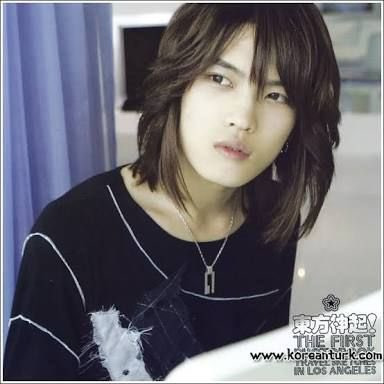

I became the first and only 11-year-old in my rural town (so rural we tried to ride the dairy cows for fun) to be obsessed with K-pop...back in 2008!!
Fast forward: The passion stays strong. My dad always wanted me to join the military, and so at 13 I joined the Navy ROTC. Thanks to a special appearance from a Marine drill sergeant who had come to give us a taste of "real" bootcamp, I burst into tears and fell out of formation. When the captain tried to comfort me by saying this was preparing me for what I wanted to do, I blurted back that no, actually, I want to teach English in South Korea!! That was the end of my short military career and my first declaration of my goal.
Although I continued listening to Kpop (and watching Kdramas, thanks to Jaejoong once more), I wouldn't pick up a Korean textbook until after--plot twist!--I'd studied Japanese for 5 years. (The anime wave hit my hometown far earlier than Hallyu did, so the self-study materials were far more accessible.) People in my town said I was the only one crazy enough to try learning Japanese and Korean at once, but I knew better: for the past 10 years I had been hearing Jaejoong sing beautifully in both those languages. (It had somehow never occurred to me that hadn't had to learn Korean from 0--ethnocentric habits die hard!) I pressed ahead with my self-studies nonetheless.
In my early 20's, I began teaching ESL online. I quickly gained a number of Korean students. Most were parents, small children, or working moms. I quickly fell in love with the "ahjumma" crowd. While I had already studied the Korean culture (not just pop culture!) in-depth, talking with so many families at so many stages in their English learning journeys unlocked new dimensions of its depth and richness.
In my mid-20's, my university recommended that I apply for a government program that sends students abroad for the summer to study one of 16 "critical" languages. I applied for Korean, citing my ESL experience, and was selected. Those two months would become one of the highlights of my life so far!
While in Korea, I didn't meet a beautiful ethereal fairy boy--and I didn't need to. By that time, I didn't even necessarily want to. Because while Jaejoong had caught the eye of my young self and sparked my initial interest, my love for Korean grew up just as I did. Of the many friends I made during my 2-month stay, most were my parents' age and the rest were my juniors in the womens' dorm. I experienced a vibrant culture both ancient and modern whose draw was in its own existence, and in the warm hospitality I encountered at every turn. I have never been happier! And, as a lovely little full-circle moment, while exploring the area around our dorm, I heard "Hug" playing from the speakers of a café.
The saga continues. I just passed round one of a scholarship competition which would send me back for another year...at long last, as an English teacher. (I also have backup plans in place if that fails.)
These days, when it comes to Jaejoong, I definitely think about him differently than I did as a child: I recognize sadly that his long time in the limelight from an early age was harmful to his physical and mental health. While I saw him as a glowing, magical archetype of an ideal man (gentle, non-threatening, beautiful, sensitive, clean and kind), I now think his real life was quite different from what he was pushed to portray. All through his life, he was carefully molded into an ideal star, always with an eye to the camera and a foot on the scale. These days, a common feature in his interviews is concerns with weight. That makes me sad and makes me feel bad about participating in the idolization that created that kind of complex. I didn't mean it that way, of course: realistically, I had no impact whatsoever on the situation in Korea at the time. However, I don't want my attitude to mirror the kind of toxicity that sets these celebrities up to fall. I want to make sure I balance enthusiasm for craft with the kind of respect and moderation that lets them remain human. These days, I hope he lives his life meaningfully for himself. I hope he can find who he is apart from the image he was dealt. Now he's 37: I wish him luck.
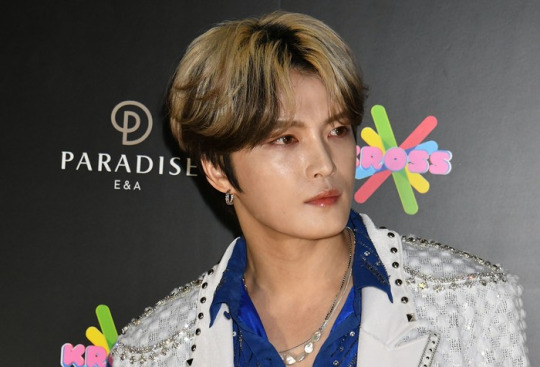
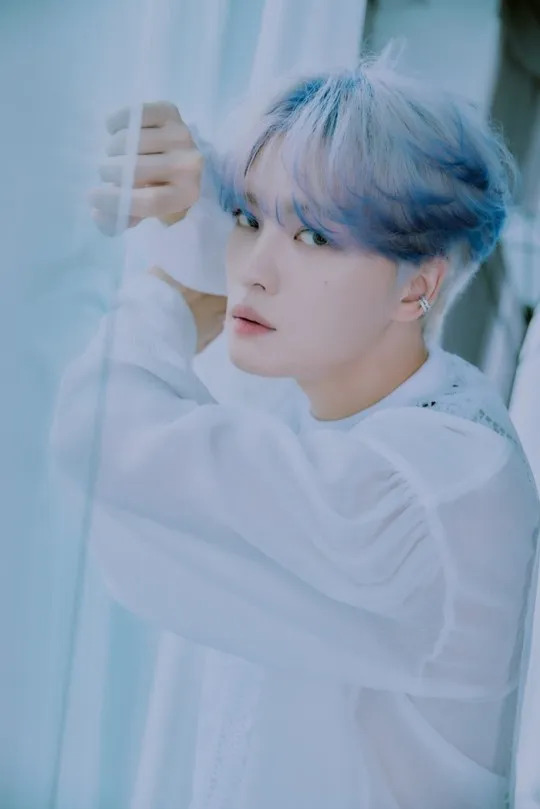
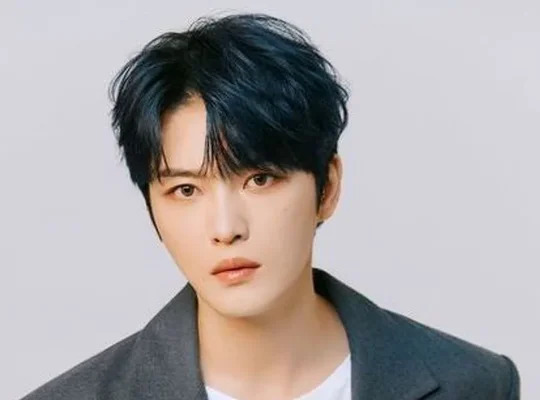
(JaeJoong in 2022-23 era)
Anyway, for why I thought about all that, I heard some of TVXQ!'s more obscure stuff for the first time in maybe 15 years, saw those old pics and got teleported back to middle school🥲 It's really been a ride!! And now I can happily report back to my young self that, just as we hoped, we did indeed learn Korean (even if we're only low intermediate for now, we'll get there!). Furthermore, when we made it to Korea, it was even better than we had dreamed.
6 notes
·
View notes
Text
vimeo
What’s worth seeing? What’s worth showing?
What does it mean to have a voice? In a culture where I don’t feel represented or feel misrepresented?
I spent the summer at ImpulsTanz festival where I was exposed to a wide array of post-modern and contemporary work in choreography. Interactions with artists who participated in DanceWEB scholarship program to talk about the work we’d seen and engaging with each other’s choreographic material helped me ruminate on value-building and taste-making as a choreographer. Generous offerings from Alban Ovenessian, Osamu Shikichi, Kim Ip, and Bettina Blanc-Penther helped me see what I wanted to see as a choreographer.
I’m finally in a place (both mentally and socially) where I feel psychological safety to speak, dance, and be, without worrying how I’d be seen, stand out, put myself in danger. Bettina shared with me Dancing around Race lecture slides from Camping, 2023 led by Gerald Cassel.
Being around artists, peers, and educators who are sensitive towards building equity-minded practices means a lot to me.
Questions I carry from the essay-this summer-into this semester
How can I choreograph with affect that comes from an intimate internal place–what you’d put in journal and would be embarrassed to reread?
How can I be a facilitator, not a censor-or to myself and to others? How can I be human in the process of inviting others into my interest/research?
How can I build a clear structure in space and communicate it so that my collaborators and I would have the freedom to delve deeply into what they want to bring to my work?
How can I utilize the underbelly of theatrical spaces?
Part II. Culture, Media and Politics
What’s cannot be seen? What has to be seen?
I chose the material that I want to be in dialogue with: an archival text from the 1970’s that I found on Korean Movie Data Base.
I am in the process of analyzing the parts of prolific writer-director Kim Ki-Young’s script that were censored by the government during Yushin Regime (1960s-70s). I still feel the heavy impact of this time of recalibration towards modernity in contemporary Korea. That is why I decided to unearth the script containing marks that
deletes
edits
inserts
The military junta heavily censored scenes written by Kim for depicting imagery associated with ideas that went against the regime. The images contain expressions of women and their empowerment (sexual, social, political) and premodern traditions associated with Buddhism, ritualistic elements, music and dance.
Looking at the script I am fascinated by images imagined by the artist vs. Censor-ers overlooking and policing, selecting — what can be shown, what was worthy of showing?
0 notes
Text
Timeline of Events
(SPOILERS! This section is updated regularly, as more information about the characters' backstories and the historical context are revealed in the fic.)
1939
Miguel O'Hara is born in New York City to a Mexican mother and an Irish father. The family quickly relocates to Mexico City at the onslaught of World War II.
Late 1940s
The O'Haras return to New York City after the war.
1950-1953
The Korean War.
1955
The Vietnam War begins.
1956
Hobart Brown is born in London to Jamaican parents of the Windrush Generation.
1958
Miguel secures a scholarship to study Biology at Princeton University.
1960
Gwendolyne Stacy is born in New York City to Irish-American parents.
Early 1960s
- New York City starts to experience economic decline.
- Gwen's mother dies when she is still an infant.
- The Stacys move into an apartment in Jackson Heights, Queens. They befriend their neighbors May and Ben Parker, a childless couple fostering their nephew Peter (also born in 1960). He and Gwen become best friends.
1961
Miles Davis Morales is born in New York City to an African-American father and a Puerto Rican mother.
1962
Miguel graduates from Princeton.
1963
Miguel is conscripted into the army. He escapes to Montreal, Canada to evade the draft.
1966
Through a Canadian government funding scheme, Miguel gets a grant to pursue a masters in Genetics at McGill University.
Late 1960s
- Labor strikes grow commonplace in the city.
- The Stonewall Uprising takes place in 1968. It is considered the beginning of the gay rights movement.
1969
Miguel continues his education at McGill, enrolling in the doctorate program.
1972
Hobie leaves school and moves to the US in search of better prospects. He eventually co-founds the punk band RiotHeart.
1973
The US orders all troops to withdraw from Vietnam.
1974
Miguel graduates with a doctorate in Human Genetics.
1975
- The Vietnam War officially ends.
- New York City declares bankruptcy and asks the government for financial assistance, which President Gerald Ford refuses. Though he relents months later and grants a series of federal loans, his initial refusal destroys his reputation in the city.
- Gwen earns a scholarship to attend Midtown Science High School.
- The band Mary Janes is formed. Gwen meets Hobie for the first time at a music event.
1976
- David Berkowitz, a.k.a. the Son of Sam, begins a long streak of serial murders around New York City.
- Gerald Ford loses against James Carter in the presidential election. His defeat in New York state is caused by the city casting an overwhelming majority of votes for Carter.
- While the city slowly pays off its debts, it continues to suffer with high unemployment and crime rates. The quality of public services reaches an all-time low, with the NYPD and MTA being severely underfunded and understaffed.
- Montreal hosts the 21st Olympic Games.
- The US celebrate its Bicentennial with extravagant 4th of July celebrations.
- Peter Parker dies in October.
- Soon after, Gwen initiates a casual relationship with Hobie.
January 1977
James Carter is sworn in as president. His first initiative is a proclamation pardoning all draft evaders. Miguel is free to come home.
March 1977
The Parkers move to Florida.
June 1977
- Miguel scores a job as a researcher at Columbia University and settles into the Parkers' old apartment.
- When Gwen fails her classes, her father hires Miguel as a personal tutor.
- Gwen meets Miles during her three-week ballet summer course.
1 note
·
View note
Link
Korean Government Scholarships Program 2024
#FullyFundedScholarships#ScholarshipPositions#StudyAbroad#StudyinSouthkorea#StudyinSouthKoreauniversities
0 notes
Text
Exploring the D4 Visa in South Korea: A Guide for Foreign Students
The D4 visa is a specialized student visa issued by the South Korean government for international students seeking to pursue language courses, research, or non-degree programs in the country. As a pathway for educational opportunities in South Korea, the D4 visa comes with specific conditions and requirements that foreign students must meet. In this blog, we will delve into the details of the D4 visa, including its eligibility criteria, application process, and the benefits it offers to students aspiring to study in this culturally rich and technologically advanced nation.
What is the D4 Visa?
The D4 visa is a short-term student visa that allows foreign nationals to study in South Korea for periods ranging from three months to two years. It is specifically designed for individuals who wish to enroll in language courses, conduct research, or participate in non-degree programs at educational institutions in South Korea.
Eligibility Criteria for the D4 Visa
To be eligible for the D4 visa, prospective students must meet certain requirements set by the South Korean immigration authorities:
Acceptance into an Educational Institution: Applicants must receive an official letter of acceptance from a recognized South Korean educational institution offering language courses, research programs, or non-degree courses.
Financial Proof: Students must demonstrate sufficient funds to cover their tuition fees and living expenses while studying in South Korea. This can include bank statements, scholarship letters, or financial guarantees from sponsors.
Good Academic Standing: Applicants must have a good academic record and be able to show their commitment to studying in South Korea.
Health Requirements: Students may need to undergo a medical examination and provide a certificate indicating that they are in good health.
Application Process
The application process for the D4 visa typically involves the following steps:
Obtain an Acceptance Letter: Prospective students must first apply and be accepted by a South Korean educational institution that offers the desired program of study.
Prepare Required Documents: Applicants must gather all necessary documents, including the acceptance letter, financial proof, passport, visa application form, and passport-sized photographs.
Submit Visa Application: The completed visa application, along with the required documents, should be submitted to the South Korean embassy or consulate in the applicant's home country.
Attend Interview (if required): Some applicants may be called for an interview to discuss their study plans and intentions for studying in South Korea.
Await Decision: Once the application is submitted, applicants must wait for the immigration authorities to process their request. The processing time can vary depending on the applicant's nationality and individual circumstances.
Conclusion
The D4 visa presents an exciting opportunity for international students to experience the vibrant culture and world-class education system of South Korea. Whether it's learning the Korean language, conducting research, or engaging in non-degree programs, the D4 visa offers a stepping stone to a rewarding and enriching educational journey in this dynamic country.
By fulfilling the eligibility requirements and following the application process diligently, students can embark on a transformative experience in South Korea and create unforgettable memories that will last a lifetime.
0 notes
Text
What is GKS scholarship for Graduate in South Korea
The Global Korea Scholarship (GKS) is a program offered by the South Korean government to international students who wish to pursue undergraduate or graduate studies in South Korea. Here are the steps to apply for the GKS 2023:
Step 1:
Check the eligibility criteria: You must be a citizen of a GKS participating country, have a high school diploma for undergraduate studies or a bachelor’s degree…

View On WordPress
0 notes
Text
A Glimpse into My Life
Where do I even begin?
Well, let's start with the fundamentals.
I go by Arrie, or Ri for short. However, within the tight-knit circle of my family and closest friends, I answer to CC, a tender nickname derived from Clementine. When my parents and friends shower me with affection, I become their Darling, an ode to the timeless tune, "Oh My Darling Clementine."
"Oh my darling, oh my darling, oh my darling, Clementine…
You are lost and gone forever, dreadful sorry, Clementine…"
Yes, I acknowledge it's a melancholic song. But indeed, I was CC throughout my childhood. It wasn't until I embarked on my college journey that people began to call me Arrie or Ri.
During my college years, I delved into Humanities, majoring in English language and literature with a focus on education. This choice was mainly driven by the scholarship opportunities available at the time. Given the chance, I would have explored history, psychology, or European languages.
Additionally, I had the privilege of participating in the Academic Exchange Program in South Korea.
Upon returning to my home country, I swiftly secured a position as a history teacher just one week after graduation. After over a year in that role, I transitioned to a Korean academy. Subsequently, I embarked on a completely different path as a guest relations officer in a theme park. My dedication and hard work paid off, leading me to eventually head the department. Seeking further professional growth, I transitioned to government service.
Simultaneously, I pursued a master's degree in Development Communication at the country's national university. However, midway through the program, I made a pivotal decision to switch to an MPA program, specializing in Regulatory Management Systems. This transition was driven by the unique opportunity to be part of the inaugural batch of the program, along with a scholarship offer that carried no service obligations. I also received admission to a paralegal program, but I had to decline due to the sheer workload on my plate.
Transitioning from the corporate world to government service, I essentially started from scratch. My responsibilities included crafting speeches, press releases, statements, and presentations, as well as managing media interactions. Essentially, I served as the voice and representative of the agency head. I was occasionally entrusted with the task of crafting materials for prominent figures such as the President, Vice President, Senators, and other high-ranking officials. It was a role that demanded an immense amount of work and came with substantial pressure, leaving me with minimal time for a social life.
After several years, I made a bold decision – I resigned.
Today, I find myself unemployed, and this temporary period of joblessness has allowed me to simply be me – Arrie.
I am Ri, the individual who derives joy from dunking her bread into a glass of orange juice.
I am Ri, an honorary expert in all things K-pop and K-drama.
I am Ri, the avid viewer of "Bridgerton" and "Emily in Paris."
I am Ri, the connoisseur of holiday films and the collector of handcrafted notebooks.
I am Ri, with a budding fascination for tea leaves.
I am Ri, who prefers raw veggies over cooked ones.
I am Ri, lactose intolerant yet enamored with milk.
I am Ri, unimpressed by the taste of matcha and particular about hotdogs and corned beef brands.
I am Ri, unfazed by wearing the same outfit repeatedly.
I am Ri, the owner of a modest collection of bags and shoes, only replacing them when they're worn out or demanded by a special occasion.
And the list goes on…
In essence, I am the real Ri, stripped of accolades and the weight of people's expectations.
0 notes
Photo

Korean Government Scholarship 2023 | Fully Funded Apply Link: https://studytoall.com/korean-government-fully-funded-scholarships/ Degree Programs: Undergraduate, Master & PhD Scholarship Award: Fully Funded English Proficiency: Without IELTS No. of Scholarships: 1278 Scholarship Location Country: South Korea Application Submission Deadline: Varies #FullyFundedScholarships #fullfunded #scholarshipopportunities #education #studytoall #scholarship #scholarshipprogram #scholarships #studyabroad #korean #studyinkorea https://www.instagram.com/p/CmbQKVTImXg/?igshid=NGJjMDIxMWI=
#fullyfundedscholarships#fullfunded#scholarshipopportunities#education#studytoall#scholarship#scholarshipprogram#scholarships#studyabroad#korean#studyinkorea
0 notes
Text
Gilman Scholarship and Pursuing Study Abroad in Korea

Victoria Halsey | Class of 2024 | International Studies and Psychology Major | Linguistics Minor | University of South Carolina
Seoul, South Korea | Spring 2022 | Global Partner Program: CIS | 서강대학교 (Sogang University)
Pursuing study abroad is possibly the best decision that I’ve made for myself. It can seem intimidating with all of the different applications, deadlines, and fees, not to mention being thousands of miles from home. However, there are so many scholarships and grants available to those who truly want the experience, and in my opinion, getting to live abroad and explore another culture is well worth the sadness of missing home.
I received the Benjamin A. Gilman Scholarship from the Department of State to help fund my studies. The program supports undergraduates who may not otherwise be able to study or intern abroad due to financial constraints with up to $5,000 per student. Those that receive a Federal Pell Grant during the application period or during the term of their study abroad program or internship are eligible to apply. The program provides students with the opportunity to form international networks and gain professional skills, language abilities, and global knowledge to advance their careers, as well as U.S. national security and economic prosperity. Gilman Scholars foster mutual understanding abroad, representing American values. They are also eligible for noncompetitive eligibility hiring status within the federal government, meaning alumni can be hired by government agencies outside of the formal competitive job announcement process.
Personally, the Gilman Program was exceptionally beneficial for me as it helped cover the remaining costs of my study abroad program after financial aid, and it required significant introspection about what I hoped to gain from my experiences abroad. The application made me think about how studying abroad would advance my academic trajectory, as well as how it might impact my future aspirations. With my major being international studies and my plans to work in the international human rights field later in life, it seems like a no-brainer how studying abroad would enhance my learning and preparations for the future. However, it made me consider why studying in Korea specifically would advance my goals and what I could contribute to the cultural exchange. After being accepted into the program, I was required to set goals for my time abroad, which encouraged me to think about specifics that I wanted to achieve abroad rather than just the big picture of expanding my global competence.
I spent my first week in quarantine due to Korea’s Covid-19 travel regulations, only leaving my room to go to Covid testing sites with other people in my program. Honestly, I didn’t mind quarantine too much as it gave me a chance to adjust to the time difference and stare at the city beyond my window, though my view wasn’t great. My first day out of quarantine was exhausting but exciting. My friend and I started the day by searching convenience stores for TMoney cards, which are used to ride buses, taxis, and the subway. We finally found some after asking an 아저씨 (ajusshi/older man) working in a store where they would be. It was the first time we talked to a stranger in Korean, and his kindness throughout the interaction gave me confidence that I would be able to navigate everyday conversation in Korean. We spent a chunk of the day searching for a health center where we needed to get a form to be allowed in most restaurants due to Covid (this policy was relaxed soon after our arrival). I was happily lost, taking in my surroundings, though the cold made my hands feel like they might fall off. We happened to wander into the Dongdaemun Design Plaza which was exciting as we had planned to visit it soon. After we finally found the center, we spent the rest of the day exploring stores and deciding what foods to try.


I learned to navigate around Seoul relatively quickly, using KakaoMaps to get everywhere; it would tell me what bus numbers I could take or which subway line that I would get on. I learned to use the bus first; the only difficulty was ensuring that I got on the correct bus and off at the correct stop before it sped away. However, if I missed my bus, there were often others that could get me to the same location, or I could wait for the same bus number to return which usually did not take long. The first few times I took the subway my friends confidently led me to our destination, so I was able to pick up how the lines worked through observation. The subway closes at midnight, which was inconvenient at times, but night buses run sporadically, meaning I would be able to get home without taking a taxi.
Knowing how to speak a little Korean and read Hangul made me significantly more comfortable in my new surroundings. Even if I didn’t always know what a Korean word meant, there were often words borrowed from English that were written in Hangul which helped me deduce what was meant by the phrase. It was especially helpful when ordering food so that I didn’t have to scan the menu with a translator app to decide what to eat.
I really enjoyed Korea’s university life. A club fair at the beginning of the semester allowed me to interact with so many other students, which I couldn’t do in my classes as they were online. Through the HUG program, I was matched with a buddy, and we met for a few meals. We got along well and had really interesting discussions with some about cultural, educational, and political differences between the US and Korea. I also joined a club for English language exchange as an opportunity to meet more people. We engaged in missions almost every week, competing against other teams in the club, and I made friends and visited areas that I may have otherwise missed. When it started to warm up, universities around Seoul had festivals open to everyone, which often boasted performances from famous Korean artists— I saw PSY in the pouring rain, surrounded by thousands of other uni students. Sogang’s festival included food trucks, drinks, and student performances, which I enjoyed with my friends.


Academically, the courses that I took at Sogang were very beneficial to my major. As an international studies major with an emphasis on Asian studies, I took courses covering Chinese philosophy, Korean history, and Southeast Asian society. I wouldn’t have been able to take these classes at USC, and I was glad to have the opportunity to take courses so tailored to my concentration. I was also able to take social psychology for my psychology major, allowing me to learn about social psychology applicable beyond the context of the US. That being said, the courses were online, limiting communication between students, but this allowed for greater possibilities for travel within Korea. Because the courses were pass/fail when they transferred to USC, I was able to focus more on my understanding of the topics rather than simply getting an A, while allowing myself time to experience Korean society outside of the classroom.
As an international studies major within the political science department, the timing of my trip was exceptional. Soon after my arrival, Korea had a presidential election, which allowed me to observe campaigning techniques and provided the opportunity to ask about political attitudes among Korean citizens. Discussing politics seemed to be a bit taboo, so I made sure that I wasn’t too forward in my curiosity.
My favorite experiences in Korea often revolved around food and the people that I enjoyed it with. Eating was a somewhat communal experience. It was almost unusual to eat alone, and many dishes were portioned for at least two people, meaning my meals were filled with friends. My Korean friends continually introduced me to delicious foods, and I made sure to try everything that was suggested to me. Some of my favorite foods include 육개장 (yukgaejang/spicy beef soup), 산낙지 (sannakji/live octopus, and 게란빵 (gyeran-ppang/egg bun).

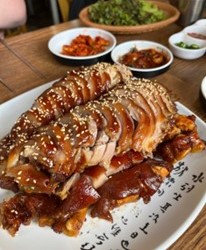
I spent most of my time in Korea exploring. I loved the walkability of the city and felt completely safe venturing out on my own, even at night (one of my Korean friends didn’t recognize pepper spray if that speaks to the safety at all). I wanted to see as much of Seoul as possible as each neighborhood had a distinct atmosphere from the next. My sense of direction is awful, but I could always tell when I had been to a neighborhood before, simply because the energy was familiar. I spent the majority of my time in Sinchon and Hongdae because Sogang University was situated next to them. After some time, I could navigate them with little help from KakaoMaps, and they felt like home. Sinchon was right next to my university, so I would often go there for food, to study, or to hang out with friends. Hongdae was a bit further, but I could easily walk through the Gyeongui Line Forest Park to get there. The park extended from the area around my university to Hongdae with restaurants and other businesses on either side of the path. The park was gorgeous (especially during cherry blossom season!!) and offered some relief from the bustling city.
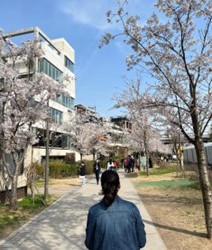

The majority of my ventures involved me wandering around palaces, temples, art museums, parks, and markets. I visited 창경궁(Changgyeonggung) on my 20th birthday to see the cherry blossoms and stunning arboretum. My friends and I went to 조계사 (Jogyesa) in Insadong to see lotus festival performances. I visited impressive art exhibitions in Seoul and Daegu, including a Salvador Dali exhibition in the DDP which I was ecstatic for due to my love of surrealist art. I visited parks like the Dream Forest (breathtaking during cherry blossom season) and Seoul National Forest. My friends and I tried as much street food as possible at the busy markets where people would cram at booths to eat and drink with friends.

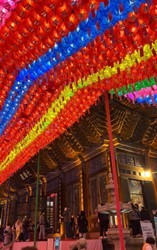
Outside Seoul, I visited Suwon, Sokcho, Gangneung, Busan, and Daegu. My friend and I decided to visit Sokcho and Gangneung via express buses. The last minute trip was a bit of a disaster but well worth it. We arrived in Sokcho with no place to sleep, heavy bags, and a bit of heat exhaustion. Eventually, I managed to get a room for us with my broken Korean. We abandoned our belongings in the room and attempted to figure out how to go to Seoraksan National Park. We found the bus that would take us into the park, but the buses of Sokcho came far less frequently than in Seoul, making us think we wouldn’t have time to explore the park. An 아줌마 (ajumma/older woman)confirmed that we were waiting for the right bus and told me stories about her experiences in the park. That interaction made me realize how much my Korean had improved while abroad because I was able to generally understand the stories and encourage her to keep talking. I saw some of the most beautiful mountains I had ever seen in the park, and we hiked to the top of one of the peaks to a Buddhist temple. We ended the night on the beach, watching as friends launched fireworks. Overall, I don’t regret the trip at all, but by the second day, my friend and I were homesick for Seoul. We had similar feelings by the end of our trip to Busan and Daegu. We visited gorgeous temples (one of which was on the coast), beaches, Yeong Island, Gamcheon cultural village, and more.
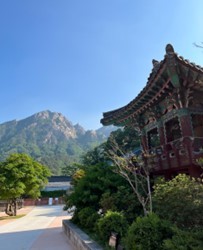

Overall, I grew a lot over the course of my study abroad experience. I didn’t experience much homesickness (aside from when I would see my friends posting about the fun things they were doing or when my sister graduated high school) because I was too busy trying to do and see as many things as possible. It confirmed my plans to work abroad as I was able to adapt to a new country and culture so quickly and was genuinely happy to be there each day. Having so many interactions with new people and unfamiliar circumstances also fostered a sense of confidence that I didn’t have previously. Essentially, I am more trusting of myself to be able to thrive in new situations as well as familiar ones.
Victoria Halsey | SC Honors College, Class of 2024 | International Studies, College of Arts and Sciences Psychology | College of Arts and Sciences
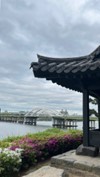

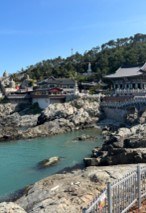

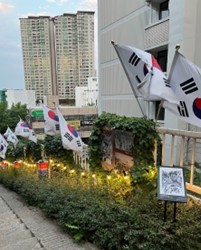

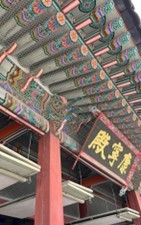


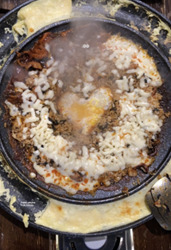





1 note
·
View note
Text
Graduate scholarships in South Korea for Canadians
Graduate scholarships in South Korea for Canadians
March 3, 2022 – The Government of the Republic of Korea is offering graduate scholarships for Canadians wishing to study or do research in South Korea.
The Global Korea Scholarship for Graduate Degrees program offers Master’s and PhD scholarships in a variety of fields including Korean studies, humanities, social sciences, natural sciences and engineering. Scholarships are tenable from August…
View On WordPress
0 notes
Text
Korea Study Abroad Scholarships
Korea Study Abroad Scholarships
The Korea Government is looking for students who want to study abroad in Korea. The Korea Scholarship Program offers scholarships to international students interested in studying Korean language and culture. The scholarships are given to the top applicants within specific slots and require that students complete a language course. Once accepted, recipients receive a monthly stipend and living…
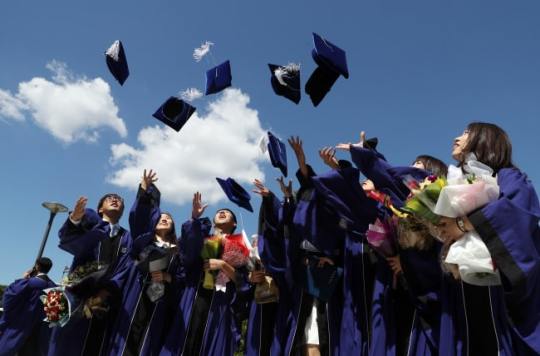
View On WordPress
0 notes
Text
Hungary Government Scholarship 2022 | Fully Funded
Hungary Government Scholarship 2022 | Fully Funded
Hungary Government Scholarship 2022 | Fully Funded-The Hungary Scholarships 2022-2023 are just like the Chinese Government Scholarship, US Fulbright scholarship, Korean Government Scholarship Program (Global Korea Scholarship), Turkiye Burslari Scholarship, Australian Awards, Swedish Institute Scholarships in Sweden, or MEXT Scholarship Japan. It covers all of your operating costs and applicants…

View On WordPress
0 notes
Photo

+ ... // STUDENT PROFILE ... LOADING
CORBIN PARK, also known as CORY, is 20 YEARS OLD and currently enrolled in kyungwon university. he is in his 3RD YEAR of the UNDERGRADUATE PROGRAM, majoring in EARLY EDUCATION with a minor in DANCE. he is notably part of the DANCE CLUB, is a STUDENT GOVERNMENT REPRESENTATIVE FOR THE DEPARTMENT OF EDUCATION and is the CATCHER of the BASEBALL TEAM. he works part-time OFF-CAMPUS in the DAWON TEAHOUSE. you may find him in the WEST WING (ROOM #2) as the RA.
+ ... // LOAD STUDENT BACKGROUND . . .
park corbin was born to a second generation korean-canadian family in Vancouver. his parents had met through a local korean church at a young age and it had been like magic. or so they thought.
after corbin–nicknamed by a goofy farther, cory–was born things started to get difficult. his parents started fighting.
he was too young to remember much of divorce, but the impact was there. the holes on the wall where photos once would hang. the empty chair at the table, the missing plate. at a young age cory witnessed his father experience great sadness. the eight year old could not really understand why his mother had left but he understood that it made his dad upset.
maybe that’s where it started.
for most of his life he has been an over achiever. he never had many friends (the annoying neighbor boy who smiled at everything and never left him alone) but he was happy for the most part. busy with baseball and helping his dad around the house. in middle school he realized his feelings for that annoying neighbor boy was probably more than just friendly.
high school everything was a lot all the time. his dad started having trouble with money, his relationship was constantly teetering on the edge of an explosion, and the stress of his future was starting to get real.
he was blind to his own issues.
did it take a crash to learn? maybe. cory fell down… down… down. breaking off his relationship for the final time–officially. declining his big sports scholarship to a prestigious school. and running off to his grandparents in the country. he stayed with them for a few months post high school graduation, talking to someone local, and befriending some of the other teens.
by the time he got back home he was more sure of himself. not perfect, but better. and with the new hope he sought out schools. soon getting into kyungwon. it was a big trip but he was ready for it.
0 notes
Link
Korean Government Scholarships Program 2024
#FullyFundedScholarships#ScholarshipPositions#StudyAbroad#StudyinSouthkorea#StudyinSouthKoreauniversities
0 notes